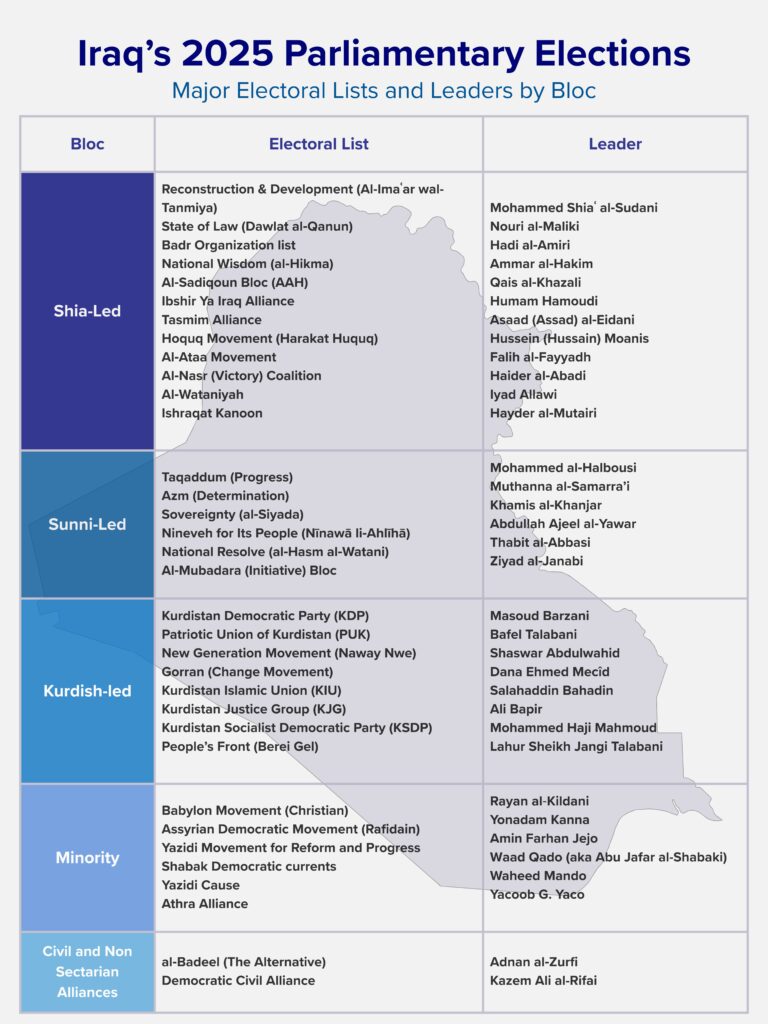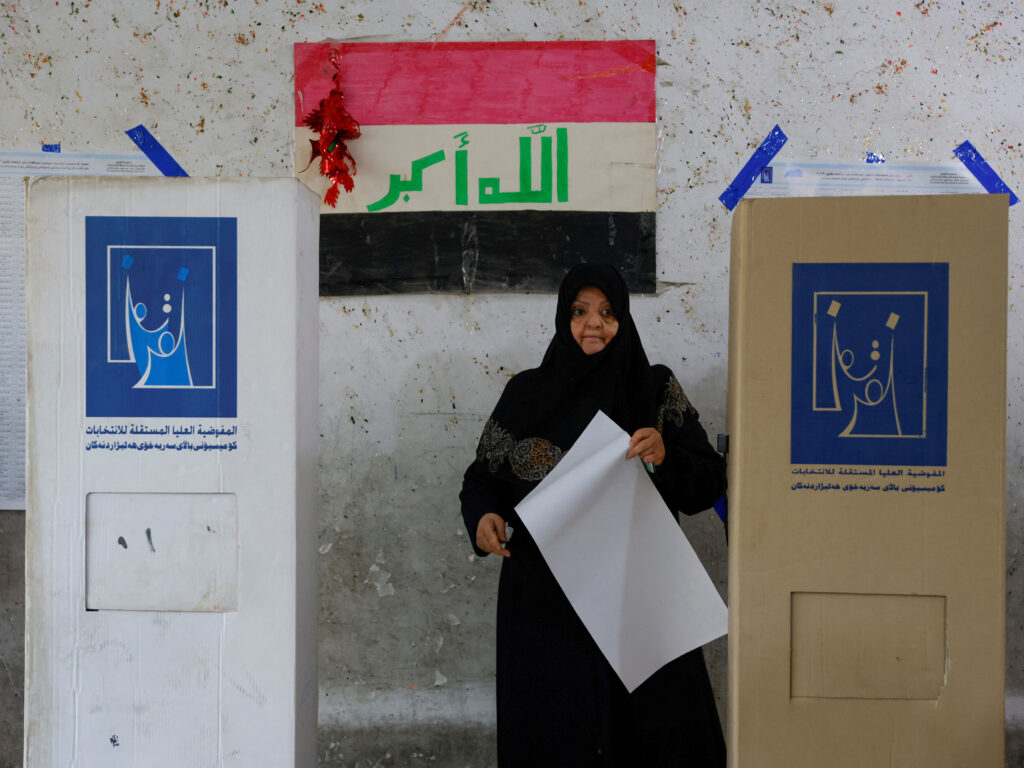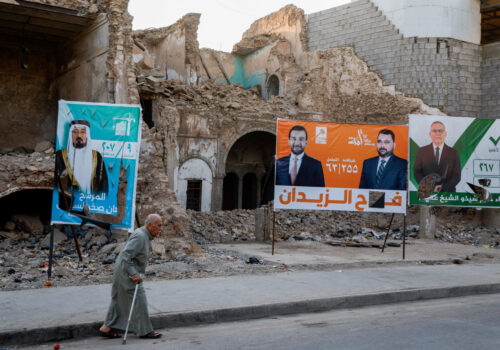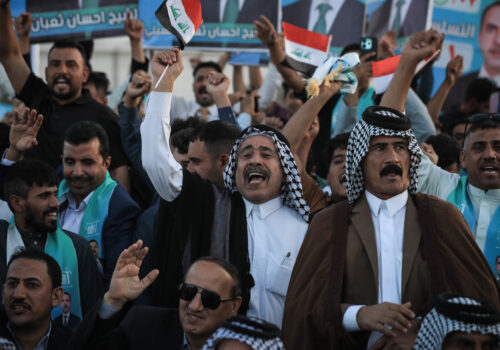Tracking Iraq’s 2025 elections and coalition building
This post was updated on January 5.
Iraq held parliamentary elections on November 11, 2025. Two decades after the fall of Saddam Hussein, elections remain the formal mechanism of democracy in Iraq, but they have largely evolved into exercises in power redistribution among established political actors. The 2025 elections and the coalition-building process that follows will test whether Iraq’s political order can maintain equilibrium without meaningful reform or whether mounting disillusionment will push it toward deeper paralysis.
As the coalition-building unfolds, our experts are mapping what to expect next for Iraq’s governance and its people.
This post will be continue to be updated as developments take place.
Key points about the election
The Shia Coordination Framework (CF), a coalition of establishment Shia parties with strong institutional and militia networks, is expected to retain dominance. Prime Minister Mohammed Shia al-Sudani’s coalition is positioned as the frontrunner, but as in previous cycles, the premiership will likely be determined through post-election bargaining among CF leaders, Kurdish blocs, and Sunni coalitions. This process is reflective of Iraq’s political equilibrium, in which an informal elite pact trades reform for order and stability.
Campaigns are visible across Baghdad and the provinces, yet public enthusiasm is muted, with low turnout expected, underscoring the deep disconnect between citizens and the state. That turnout is projected to fall below the already–low 41 percent recorded in 2021. Persistent corruption, patronage, and coercive political financing have eroded trust in elections as paths to accountability. Party spending has reached record levels, making financial leverage and control over state employment decisive in mobilizing votes. The boycott by prominent Shia cleric Moqtada al-Sadr’s Sadrist Movement, once the largest parliamentary bloc, further reduced competition and narrowed participation.
Elections Law No. 9, passed in 2020 to address demands of local protests, reverts to larger provincial constituencies, in the end favoring dominant parties and diminishing space for independents who gained traction in 2021. The outcome of these elections will shape Iraq’s balance of power more through elite negotiation than through popular mandate. For international observers and partners, particularly the United States, the main concern lies in whether the process reinforces stability or reignites factional contestation.
What to know about the electoral system
Iraq’s parliamentary elections are governed by the amended Election Law No. 9 of 2020, which reinstated proportional representation through a mathematical formula that divides votes by odd divisors (1.7, 3, 5, 7, and so on) to determine how many seats each political list receives. Each of Iraq’s eighteen provinces acts as a single voting district, and its seats in the 329-member parliament are distributed according to population. Once a list wins seats, they are given to the candidates on that list who earned the highest number of votes. Iraqi law requires that 25 percent of parliamentary seats, eighty-three in total, be reserved for women, and that nine seats be reserved for minorities such as Christians, Yazidis, Shabaks, Mandaeans, and Feyli Kurds. Vacant seats are filled by the next-highest vote-getter from the same list or community.
While supporters of the current law argue that it strengthens stability and party cohesion, critics contend that the return to larger districts and closed party lists weakens independent candidates and concentrates power among established elites.
Key political players and alliances

What the parliament has looked like over time
Election results
Note: This does not include smaller winning coalitions that are affiliated with the larger blocs listed above. For example, two separate coalitions in Anbar with a total of six seats are generally considered to be affiliated with Taqadum but have not been added to Taqadum’s tally.
What to expect for government formation
Iraq’s elections rarely produce an outright winner. Instead, coalitions and political negotiations determine who leads the country.
After the election, the parliament elects Iraq’s president, who then formally nominates the prime minister, who is chosen through post-election bargaining among the largest parliamentary blocs. The prime minister designate has thirty days to propose a cabinet and win a vote of confidence in parliament. Until that vote, which in recent years has taken many months of negotiation, the previous cabinet remains in place as a caretaker government, allowed only to manage day-to-day affairs and not to launch major policy changes.
Victoria J. Taylor is the director of the Iraq Initiative in the Atlantic Council’s Middle East programs.
Nibras Basitkey is the associate director of the Iraq Initiative at the Atlantic Council’s Middle East programs.
Daniah Jarrah is a young global professional at the Atlantic Council’s Rafik Hariri Center and Middle East programs.
Related Events
Related Content
Stay updated
Stay connected

The Iraq Initiative is driving policy-oriented programs and analysis that advance Iraq’s stability and sovereignty, regional integration, and democratic and economic development. It also aims to promote a strengthened US-Iraq partnership.
Image: Supporters attend an election campaign rally for the State of Law Coalition, ahead of Iraq's parliamentary elections, in Baghdad, Iraq November 7, 2025. REUTERS/Thaier Al-Sudani




Follow the conversation on X with @AtlanticCouncil and @ACMideast using the hashtag #ACIraq